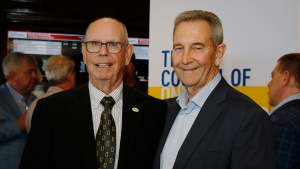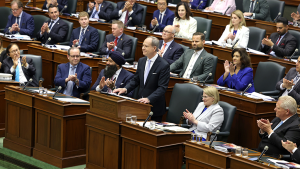Karen Renkema, public affairs advisor for PCA, will be assuming the role of vice-president, Ontario. Sean Reid, who held the position for 10 years, is leaving PCA to launch his own small business coaching and consulting company.
“This industry is vibrant, it’s innovative, it’s exciting and I think there is a lot of opportunity here for us to work together as an industry to be progressive, not just our contractors, but the industry as a whole and I am really looking forward to have to opportunity to take a leadership role,” said Renkema.
Renkema has been part of the construction industry in Ontario for more than 12 years so the new role is a natural fit, she said. Her career in the construction industry started at the Council of Ontario Construction Associations (COCA) as the vice-president of government relations, followed by five years at the Ontario Road Builders’ Association as director of government relations. She joined PCA in 2013 and became the lead in advocacy and government relations.
“The reason I joined PCA back in 2013 is I was really driven by their message specifically around contractors being able to compete on projects regardless of who their workforce has chosen to affiliate with — union, non-union or independent,” explained Renkema.
“It really was a fairness message for me, primarily fairness for the workers that work in the construction industry that make choices but also a fairness issue for contractors.”
Her focus will be on building stronger relationships with members.
“Sean built a very robust PCA membership and organization here in Ontario and I’ve got big shoes to fill,” admitted Renkema. “My focus really is to continually create that cohesion within our membership… We’ve got a very diverse membership and one of my priorities for the first six months is just really spending some time with the members and hearing them as well as putting a little more focus this year on membership visits and membership events.”
“Two of our largest government relations issues have been accomplished in the past year — fair and open tendering and the wind down of the Ontario College of Trades (OCOT),” Renkema added. “I think I now have a really good opportunity to reset with the membership and ensure we have their priorities in mind as we move forward from an advocacy standpoint and also a membership service standpoint.
Over the years, Renkema has worked on a number of files including building a coalition focused on OCOT and the expansion of compulsory certification.
We are very focused on making sure this transition is smooth,
— Karen Renkema
PCA
“I lead the Ontario Skilled Trades Alliance and I was the spokesperson and the chairperson for the Stop the Trades Tax campaign leading into the 2014 election and worked with a number of industry partners on that,” she said.
“Beyond that I did a lot of work on health and safety and general infrastructure policy at COCA. At ORBA I did a lot of work on health and safety, membership integration, transportation and trucking, the environment and procurement. The carryover into PCA was definitely the conversation about our labour force.”
From a labour relations perspective there are a few priorities for PCA in the coming year, particularly around fair and open procurement.
“It’s no longer fair and open tendering, it’s fair and open procurement from the aspect of any further changes to the Ontario Labour Relations Act that would prohibit contractors to compete based on their union affiliation,” explained Renkema. “A good example of that might be a further expansion of project labour agreements that aren’t necessarily open to all players in the industry.”
They also plan to focus on what happens next as the OCOT winds down.
“Our members fully support a very rigorous enforcement system for the compulsory trades,” said Renkema. “We are very focused on making sure this transition is smooth and that it lands in the right place.”
The larger question when it comes to the transition is how to deal with young people, those who choose construction as a second career and anyone looking to enter the industry.
“I don’t think the Ontario College of Trades ever really served as that one-stop shop — they wanted to but they never quite got there,” Renkema stated. “I think there is a real opportunity here to transform what the public facing role looks like for skilled workers trying to enter the industry.”
In addition, there has to be a larger conversation about accessibility of training and ensuring training is both regionally available to all stakeholders and appropriate, Renkema noted.
“I know there is low hanging fruit but we also have to answer some of these much larger questions and ensure we are providing opportunities for everybody and that we don’t continue to operate in silos like we have been for so long within the industry,” she said.








Recent Comments